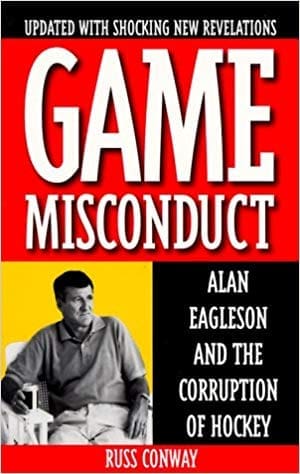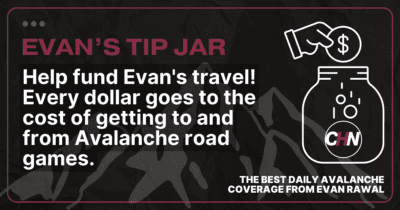Avalanche Storytime with Adrian
Avalanche Storytime with Adrian: The night Ray Bourque and I were lucky enough to hear stories from Russ Conway

It was with considerable sadness today that I heard the news of the passing of Russ Conway today at age 70. Who was Russ Conway, you ask?
He was a giant to us hockey writers. He’s a guy who worked his whole life for a small-town newspaper, the Lawrence Eagle-Tribune, in Lawrence, Mass. He started at the paper when he was 18 years old. He started covering the Boston Bruins in 1967. He’s a guy who almost single-handedly brought down the reign of former NHL Players Association director Alan Eagleson, probably the most powerful person in all of hockey for much of the 1970s and ’80s.
As Michael Farber so aptly put it in a 1996 story on Conway for Sports Illustrated, what Conway accomplished with his work was the “journalistic equivalent of David’s slingshot.”
For a small-town newspaper in a distant suburb of Boston, Conway uncovered all of the corruption and duplicitous dealing of Eagleson, and with it changed the lives of thousands of players, past and present. NHL players today probably have never heard of Russ Conway, but their salaries almost certainly would be a lot smaller without the pioneering work he put forth for the Eagle-Tribune.
Conway finished as the runner-up for the Pulitzer Prize for beat reporting in 1992 for his work exposing Eagleson. That’s just how monumental it was. He wrote a great book about it all, called “Game Misconduct: Alan Eagleson and the Corruption of Hockey”, which is absolute must-reading for any hockey fan and all would-be sportswriters. When anyone who asks “What’s a good book about what it takes to be a newspaper/sports/media person?” I have often said, “Read Game Misconduct, by Russ Conway.”
Conway could have gone on to much bigger papers/entities in the business. He had offers. But he always chose to stay in Lawrence, working for the Eagle-Tribune. He was the paper’s sports editor for about four decades. He really cared about the community. He absolutely thought that coverage of a high-school game by the paper warranted as much care and attention as any Bruins game, probably more so.
I was privileged to know Russ a little. When I first started covering the NHL in 1995, somebody – it might have been Farber – recommended I read “Game Misconduct.” I think it took me two or three years to actually read it, and that was my loss, because it was great – and very influential on me. Russ talks some, in the beginning of the book, about how he always wanted to be more than just a “stenographer” as a sportswriter. To me, being called a “stenographer” is about the worst insult I can think of for a sports media person. Anyone can sit in a press box, take down what happened in a game and write what the players said afterward.
That’s stenography though. That’s not being a real reporter. That’s too easy. The true test for anyone doing this is: Can you tell me the real story behind the story? Can you tell me what I don’t already know? And can you do it without being compromised – a shill, in other words – for just one side?
Anyway, I got to meet Russ at the Hockey Hall of Fame in 2004 in Toronto. Russ was there to document Ray Bourque’s induction that year, and I was sent there too, by The Denver Post. Russ wasn’t just a visitor to the HHOF, though. He was a member.
He was inducted to the HHOF in 1999, as the winner of the Elmer Ferguson Award, given to distinguished media people for coverage of the game.
The night of the induction ceremony was something I’ll never forget, definitely in my top-10 of career highlights. Before the ceremonies, there is always a private party in the back of the HHOF building, and all members, past and present, are invited.
Jim Matheson, the HHOF writer from the Edmonton Journal and, by this time, a friend, had a ticket to the party and he was allowed to bring one guest. He asked if I wanted to be his sidekick. Hell yes, I said. All I can say is, it was unreal being at this party. So here was one moment from it: here I am, standing off to one side and right beside me were…Gordie Howe, Bobby Orr and Wayne Gretzky, standing together, having a conversation, right next to a huge platter of shrimp. I mean, it was like standing next to a real-life Mount Rushmore of hockey. I just kept saying to myself, “That’s Gordie Howe, Bobby Orr and Wayne Goddamn Gretzky, standing right next to me, at a party, in Toronto.”
After the ceremonies, Matty and I went back to the hotel, the Westin Bayshore, and its legendary lobby bar. If you are ever in Toronto, o ye hockey fan, do yourself a favor and make a visit to the lobby bar at the Westin Bayshore. Everybody who is anybody in the game of hockey has had a drink or several at that bar, and you almost certainly will run into someone from the NHL while you’re actually in there, especially on a game night.
The bar was very crowded, full of hockey people, one of whom was Conway – always distinctive with his long sideburns and aviator-style glasses. I’d been covering the league for nine years by now, but had never had the chance to meet him I don’t think. So I worked up the nerve to walk to his seat at the bar and introduce myself and to tell him that I was a big admirer of his work.
Russ was very cordial in response, and invited me to sit with him (Matty had gone up to his room by now). Next thing I know, I’m four or five beers in with Russ Conway, and he’s telling me all kinds of great Bourque stories and Bruins stories and Orr stories and Eagleson stories and newspaper stories. I think he liked the fact that I hailed from just up the road in New Hampshire and started out at a small New England paper.
Over the next couple of years, Russ became a very frequent phone companion. Sometimes, he would even call me. We were both covering the NHL lockout of 2005 for our respective papers, and he would sometimes call me to compare notes on what we’d heard about the lockout. Imagine the “pinch me” moments I had over that – Russ Conway, calling me to ask what I’d heard? (In 2013, I actually was the one who broke the news of the end of the NHL lockout that year for The Post. One of the first people to call and congratulate me was Russ Conway. I told him that some of the reporting techniques I used to get that story were what I learned from reading “Game Misconduct” and he was tickled by that).
Anyway, on that night in Toronto, we’re probably five or six beers in by now (Russ, I’m proud to say, could go toe to toe with most anyone at the bar) and the crowd has thinned out by now. It’s just me, him, his girlfriend and a few other stragglers when suddenly in walks Ray Bourque – alone. He comes to the bar, sees me and Russ sitting there and joins us.
For the next 90 minutes or so, til closing time actually, Bourque, me, Russ and his girlfriend just shot the shit together. I don’t know why Bourque was all alone coming back to the hotel on the night of his HHOF induction, but we didn’t ask. Russ kept us all spellbound with story after story. He was telling more Bobby Orr stories at one point, and Bourque was just like me – lapping up every word. I think the tab was something like $250 by now, and when the check came, Russ and I reached for our wallets. I remember Bourque quickly grabbed the check, left about $350 in cash on the bar and that was that.
When we all straggled back to the elevator for the rides back to our rooms, Bourque was the first to get out and what I remember most was him wishing Russ well and saying “thanks for all you’ve done for me and the rest of the players.” Russ’s face lit up once more. (He said “good night, tall red-headed guy from Denver” too).
I said how much fun and what an honor it was for me, too, as I exited to my room. What a night. I’m lucky I got to live it, and to have known Russ Conway.












